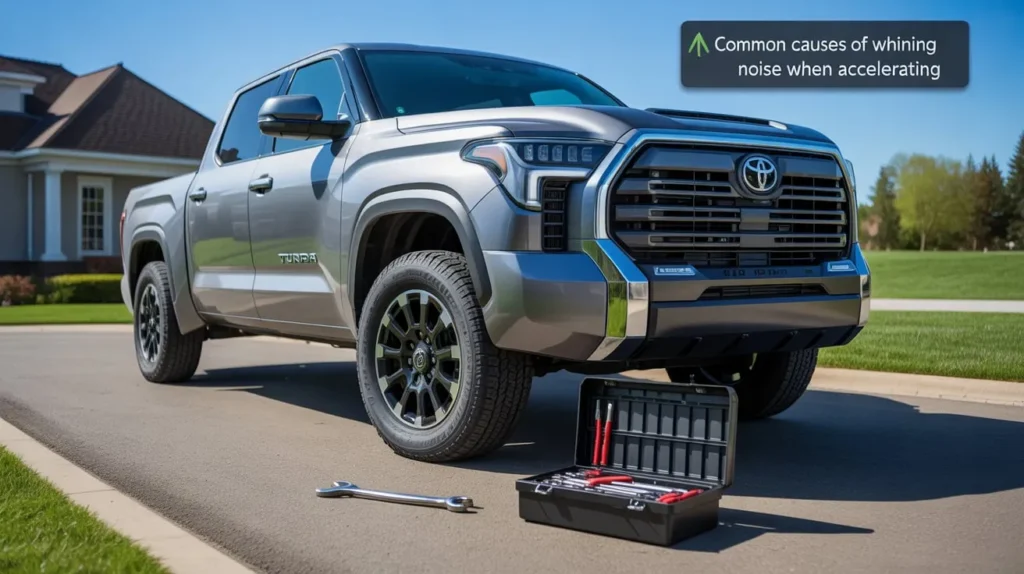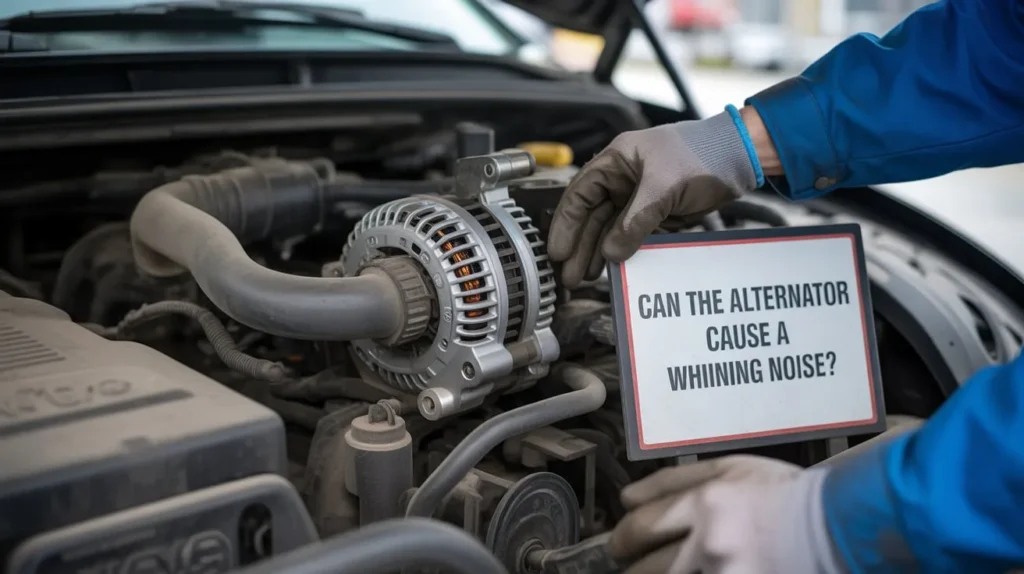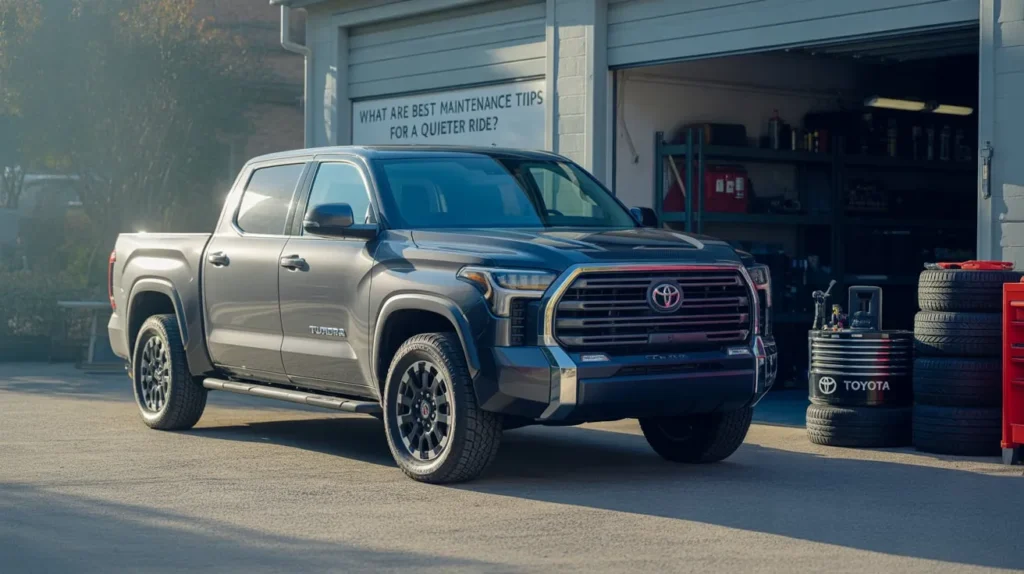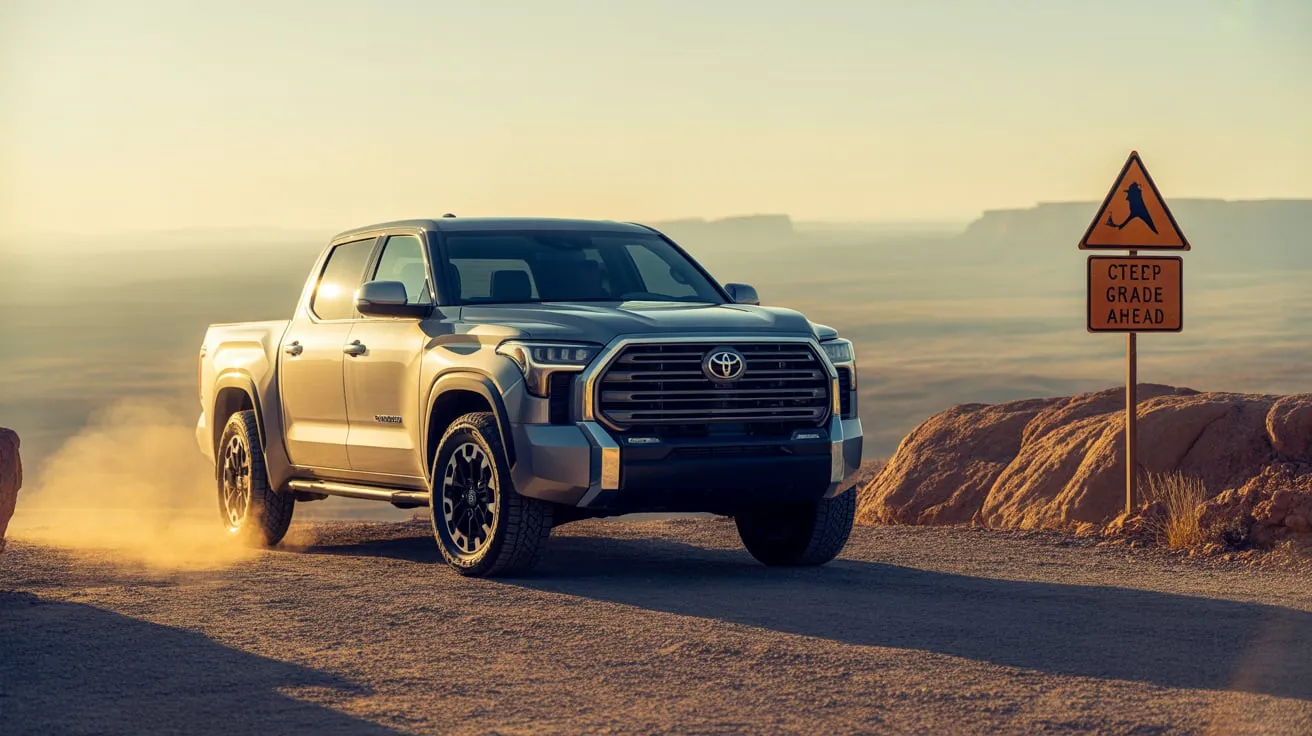If you’re experiencing a Toyota Tundra whining noise when accelerating, you’re not alone. This issue can be caused by several factors, often related to key components like the serpentine belt, power steering fluid, or transmission issues. A whining noise during acceleration is a common sign that something is amiss in your vehicle. It’s crucial to address the problem early to avoid further damage to your car transmission or other vital systems. By diagnosing the cause, whether it’s a worn-out serpentine belt or low power steering fluid, you can prevent expensive repairs and enjoy a quieter, smoother ride in your Toyota Tundra.
What Is the Whining Noise When I Accelerate My Toyota Tundra?
When you hear a whining noise during acceleration in your Toyota Tundra, it usually indicates an underlying issue. This sound can come from different areas, like the transmission, power steering fluid, or alternator issues. It could also happen due to serpentine belt wear or worn-out bearings. If left unchecked, this noise may lead to further car transmission issues, so it’s crucial to address it early.
When Does the Whining Noise Typically Occur in a Toyota Tundra?
The whining noise in your Toyota Tundra tends to occur when you press the gas pedal to accelerate. You might also hear it when turning or when the engine is under load. The sound often gets louder as the vehicle gains speed. Acceleration noise causes are mainly linked to components that work harder when the vehicle speeds up, such as the alternator or transmission.

Common Causes of Whining Noise When Accelerating in Your Toyota Tundra
There are several causes of whining noise in trucks, particularly during acceleration. Here are the main reasons:
- Loose or Worn-out Serpentine Belt: If the serpentine belt is worn or loose, it may slip during acceleration, causing a high-pitched whining noise.
- Low Power Steering Fluid: Insufficient power steering fluid can lead to power steering problems that cause a whining sound when turning or accelerating.
- Transmission Issues: If your car transmission is having issues, such as worn-out components or slipping gears, you may hear a whining noise.
- Failing Alternator: A bad alternator can generate an alternator whining noise as it works harder during acceleration.
How to Diagnose the Source of the Whining Noise in Your Toyota Tundra
To troubleshoot the whining noise during acceleration, start by checking the serpentine belt for wear and proper tension. Then, inspect the power steering fluid levels. Listen to the transmission while shifting gears to determine if the noise changes. Finally, check the alternator for wear and ensure that the bearings are not worn out. Diagnosing a whining noise in the Toyota Tundra helps pinpoint the problem.
Is the Whining Noise a Sign of a Transmission Problem in a Toyota Tundra?
Yes, the whining noise can be a sign of transmission issues when accelerating. Common transmission problems include low fluid levels, dirty fluid, or worn-out components that need immediate attention. If this problem is left unresolved, it could escalate into more expensive repairs.

Can the Alternator Cause a Whining Noise When Accelerating in a Toyota Tundra?
A bad alternator can cause a whining noise when accelerating. As the engine speed increases, the alternator works harder, often producing a high-pitched sound. If the alternator is malfunctioning, it may need to be replaced to eliminate the noise.
Why Is My Toyota Tundra Making a High-Pitched Noise When I Accelerate?
A high-pitched whining noise when accelerating in your Toyota Tundra is typically caused by a loose or worn-out serpentine belt. It could also be due to a low power steering fluid solution or issues with the alternator. Worn-out bearings can also contribute to this noise, and it’s important to check all related components to fix the problem.
How To Stop the Whining Noise When Accelerating in a Toyota Tundra?
To fix the whining noise in cars, follow these steps:
- Check if the transmission fluid is low or dirty and top it up.
- Inspect the serpentine belt and replace it if it’s loose or worn.
- Ensure that power steering fluid is at the correct level.
- Check the alternator and replace it if it’s failing.
- Visit a mechanic for more complex issues, like internal transmission problems.
How to Prevent Transmission Whine in the Future
To prevent future transmission whine troubleshooting, perform regular maintenance on your Toyota Tundra:
- Change the transmission fluid as recommended by the manufacturer.
- Inspect the serpentine belt regularly for wear.
- Ensure power steering fluid is always at the correct level.
- Perform periodic car diagnostics to identify any issues early on.

What Are the Best Maintenance Tips for a Quieter Ride in Your Toyota Tundra?
Here are a few car maintenance tips to help you achieve a quieter ride:
- Regularly check and replace fluids, such as engine oil and transmission fluid.
- Replace worn-out parts like serpentine belts and bearings to prevent noise.
- Maintain tire pressure and alignment to reduce road noise.
- Keep your exhaust system in good condition by checking for leaks.
- Regularly inspect and replace parts of the suspension system that may cause noise.
When Should You Visit a Mechanic for a Whining Noise in Your Toyota Tundra?
If you notice a persistent whining noise during acceleration, it’s a sign that something in your Toyota Tundra needs attention. If the noise is accompanied by other symptoms like difficulty shifting gears or power loss, it’s time to take your vehicle to a professional mechanic. Transmission and engine maintenance should not be delayed to avoid further damage.
How to Choose the Right Mechanic for Diagnosing and Fixing Whining Noise Issues
When selecting a mechanic for your Toyota Tundra, ensure they have experience with diagnosing whining noise issues. Look for someone who is familiar with transmission whine solutions and can offer detailed car diagnostics. A reliable mechanic will inspect all components, from the serpentine belt to the alternator, ensuring an accurate diagnosis and quick fix.
FAQs
1. What causes a whining noise when accelerating in a Toyota Tundra?
A whining noise during acceleration can be caused by issues like a worn-out serpentine belt, low power steering fluid, or transmission problems. It can also occur due to a failing alternator.
2. How can I stop the whining noise in my Toyota Tundra?
To stop the whining noise, check the transmission fluid, inspect and replace the serpentine belt, ensure power steering fluid is topped up, and get the alternator checked.
3. Is the whining noise a sign of a serious transmission issue in my Toyota Tundra?
Yes, a whining noise can indicate a transmission problem such as low fluid levels, worn-out components, or slipping gears. It’s important to address it immediately to avoid costly repairs.
4. Why is my Toyota Tundra making a high-pitched noise when I accelerate?
A high-pitched noise during acceleration is often caused by a loose or worn serpentine belt, low power steering fluid, or issues with the alternator or bearings.
5. How can I prevent whining noise issues in the future?
Regularly maintain your Toyota Tundra by changing transmission fluid, inspecting the serpentine belt, and ensuring power steering fluid is at the right level. Periodic car diagnostics also help prevent future issues.
6. When should I take my Toyota Tundra to a mechanic for a whining noise?
If the whining noise persists and is accompanied by symptoms like difficulty shifting gears or loss of power, it’s time to visit a mechanic for a proper diagnosis.
Conclusion
In conclusion, a whining noise in your Toyota Tundra can indicate several potential issues, such as problems with the serpentine belt, power steering fluid, or transmission. Regular maintenance and prompt attention to the issue can help prevent further damage. Make sure to have a trusted mechanic inspect your vehicle for accurate diagnosis and timely repairs to ensure a smoother and quieter ride.

